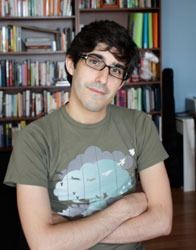Anthony Todd
Anthony Todd, CSGS Dissertation Fellow in 2010-11, has been deeply involved in the Center for the Study of Gender and Sexuality for many years, having served as the BA Preceptor in 2010 and the GSSW workshop coordinator in 2008-09 and teaching a free standing CSGS course, "Masculinity in America: Past & Present," in 2009. He is currently finishing his dissertation, "An Ethical Bohemia: Institutions, Social Networks and the Origins of the Progressive Community in Chicago, 1871-1912" in the History Department as he starts his first year of law school at Northwestern.
Progressive-Era Chicago was one of the greatest activist "scenes" in American history. With much of the city living in abject poverty and a minimum of social services, reformers had their work cut out for them. But at the same time, with a city so recently destroyed and with money flowing like water, reformers had a unique opportunity to completely revise the American city. In my dissertation, "An Ethical Bohemia: Institutions, Social Networks and the Origins of the Progressive Community in Chicago, 1871-1912," I explore this activist community and the unique ways that they organized political change, as well as the ways that political involvement changed their lives. Chicago progressives helped to create the profession of social work, they ran the most famous and effective settlement houses in the United States and engaged closely with labor unions and city government as mediators. This is also a uniquely gendered story, with men and women working (and living) together for the first time in American political history. The efforts of male progressives to engage with women's lives and political concerns, and the efforts of female progressives (who could not yet vote) to affect Chicago's machine-driven, male-dominated government, have not yet been adequately explored by historians.
At the same time, this is a story of academic knowledge, especially academic social science, applied to the real-life business of urban political reform. Many of the main characters had graduate or law degrees, and chose to spend at least part of their lives using their academic skills to engage with the non-academic world, while maintaining their credentials and contributing important works to their respective fields. In writing this dissertation and simultaneously attending Northwestern law school, I am inspired by their example; both to document their stories as a professional historian and to attempt to use my own analytical skills to better the lives of real people.
